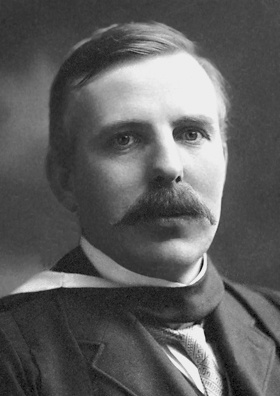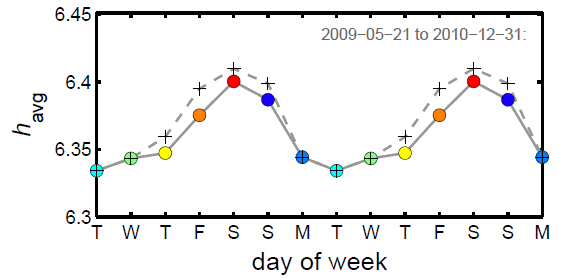
The Happiness Equation
July 25, 2016 In high school, I was enlightened when I discovered that the mathematics I had learned could actually be used in real life. Most things I learned in school appeared to be utterly useless at the time, but I could use mathematics for optimization. Was it better to spend my money a little at a time on frivolous things, such as ice cream cones; or, save it to buy an item like a radio that I could enjoy for a much longer time? My route to greatest happiness started by assigning a happiness score to each item, multiplying those items by the time they could be enjoyed, and looking at outcomes that summed to the available funds. In practice, it was difficult to decide what items made me happier than others, so they all defaulted to the same happiness. After that, the math was simple, which was important in those days before ubiquitous computers. After all that, I would ignore the analysis, buy the ice cream cone, or spend my money on some girl. The world is written in the language of mathematics, and physicists know quite a bit of mathematics. Nobel laureate, Ernest Rutherford, must have been thinking about the mathematical aspect of physics when he said that "all science is either physics or stamp collecting." While mathematics is validly applied to physics, chemistry, biology, engineering, and (via statistics) to psychology, it's been applied inappropriately to many of the social sciences. | Ernest Rutherford (1871-1937). Rutherford, a physicist, was awarded the 1908 Nobel Prize in Chemistry, which must have reinforced his belief that serious science is all physics. (Via Wikimedia Commons.) |
 Happiness throughout the week (Fig. 5 from Ref. 2), licensed under the Creative Commons Attribution License.
While modern business strives to enhance overall happiness by devising win-win solutions, the business motto of the past was that it's not enough to succeed, but that others must fail. Recent research at the University College London has shown that the failure and success of others will modify a person's happiness.[3-4] They've devised a "happiness equation" that describes how a person's qualities of happiness, guilt, and envy are intertwined.[4]
They developed their equation, an extended version of one published in a 2014 study,[5] through an analysis of an experiment that tested their research subjects' performance on three different monetary risk/reward tasks.[3] They found that a person's emotional state depends not just on the rewards they've received, but also on the rewards received by a partner. If the reward is not equal, giving an advantage to one partner over the other, the average momentary happiness is reduced.[3] This study adds to the corpus of "no man is an island" evidence in which social strictures strongly impact emotional state.
Happiness throughout the week (Fig. 5 from Ref. 2), licensed under the Creative Commons Attribution License.
While modern business strives to enhance overall happiness by devising win-win solutions, the business motto of the past was that it's not enough to succeed, but that others must fail. Recent research at the University College London has shown that the failure and success of others will modify a person's happiness.[3-4] They've devised a "happiness equation" that describes how a person's qualities of happiness, guilt, and envy are intertwined.[4]
They developed their equation, an extended version of one published in a 2014 study,[5] through an analysis of an experiment that tested their research subjects' performance on three different monetary risk/reward tasks.[3] They found that a person's emotional state depends not just on the rewards they've received, but also on the rewards received by a partner. If the reward is not equal, giving an advantage to one partner over the other, the average momentary happiness is reduced.[3] This study adds to the corpus of "no man is an island" evidence in which social strictures strongly impact emotional state.
 | The expression, "no man is an island," originates from Devotions upon Emergent Occasions by English poet, John Donne (1572-1631). (From an 1825 engraving by J.W. Cook, Wellcome Trust image ICV No 7038-V0006823, via Wikimedia Commons.) |
 |
| The happiness equation giving happiness as a function of the number of trials, t. The W coefficients are, of course, weighting factors, while γ is a forgetting factor that gives greater importance to recent trials than earlier ones. CR is the reward chosen instead of a gamble, EV is the average reward for the gamble, RPE is the "reinforcement prediction error," which is equal to the reward received minus the expectation of a reward. If the CR is chosen, then EVj = 0 and RPEj = 0; if the gamble is chosen, then CRj = 0. W4 is the guilt factor, while W5 is the envy factor. This is a complicated equation, so the best explanation is in the original paper.[3] (Original equation by Robb Rutledge, University College London, rendered using Inkscape). |
“Our equation can predict exactly how happy people will be based not only on what happens to them but also what happens to the people around them... On average we are less happy if others get more or less than us, but this varies a lot from person to person. Interestingly, the equation allows us to predict how generous an individual will be in a separate scenario when they are asked how they would like to split a small amount of money with another person. Based on exactly how inequality affects their happiness, we can predict which individuals will be altruistic."[4]As Archy de Berker, co-lead author of the study, further explains,
"Our results suggest that generosity towards strangers relates to how our happiness is affected by the inequalities we experience in our daily life... Economists have had difficulty explaining why some people are more generous than others, and our experiments offers an explanation. Such methods could help us better understand certain aspects of social disorders, such as indifference to the suffering of others."[4]
References:
- Andrew W. Lo, and Mark T. Mueller, "WARNING: Physics Envy May Be Hazardous To Your Wealth!" arXiv, March 20, 2010.
- Peter Sheridan Dodds, Kameron Decker Harris, Isabel M. Kloumann, Catherine A. Bliss and Christopher M. Danforth, "Temporal patterns of happiness and information in a global social network: Hedonometrics and Twitter," PLoS ONE, vol. 6, no. 12 (December 7, 2011), Article no. e26752, doi:10.1371/journal.pone.0026752. This article appears, also, on arXiv.
- Robb B. Rutledge, Archy O. de Berker, Svenja Espenhahn, Peter Dayan, and Raymond J. Dolan, "The social contingency of momentary subjective well-being," Nature Communications, vol. 7, Article no. 11825, June 13, 2016, doi:10.1038/ncomms11825. This is an open access article with a PDF file available here.
- New equation reveals how other people's fortunes affect our happiness, University College London Press Release, June 14, 2016.
- R.B. Rutledge, N. Skandali, P. Dayan, and R.J. Dolan, "A computational and neural model of momentary subjective well-being," Proc. Natl Acad. Sci. USA, vol. 111, no. 33 (August 19, 2014), pp. 12252-12257.